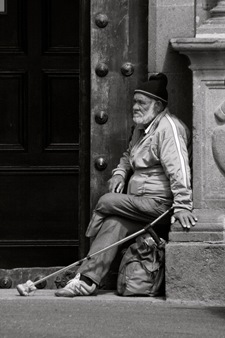 Elder Abuse
Elder Abuse
Those who are in a position of caring for older and vulnerable adults provide a valuable and courageous service. There are many challenges in providing for vulnerable and partially handicapped adults in health care, financial items, and other matters. However, primary caretakers for vulnerable adults cannot do it all. Often times, they bring in other people to assist with caretaking abilities.
There is nothing per se problematic about that and it is often a benefit to the caretaker and the vulnerable adult. However, vulnerable adults are often the target of financial exploitation. This article attempts to explain Minnesotas vulnerable adult provisions and provide some warning signs that may be helpful.
There are two statutes providing for the protection of vulnerable adults and the elderly. The Minnesota Vulnerable Adults Act seeks to protect adults who, because of physical and mental disability or dependency on institutional services [and] are particularly vulnerable to maltreatment. Minn. Stat. 626.557 subd. 1. The definition of vulnerable adult is broad but is generally a person above the age of 18 who is a resident of an inpatient facility or receives services from a home care provider. Minn. Stat. 626.5572 subd. 21.
Minnesota also has proposed a consumer protection law for the elderly. The proposed Deceptive Acts Perpetrated Against Senior Citizens or Disabled Persons creates fines up to $10,000 for consumer fraud committed against a senior citizen or disabled person and is targeted at the senior citizens primary source of income. Minn. Stat. 325F.71 subd. 2.
Hennepin County
In Hennepin County alone, there is concern that vulnerable adults and the elderly are subject to financial exploitation and other abuse. (Minnesota Continuing Legal Education 2014 Elder Law Institute, Oct. 6, 7 2014). Furthermore, vulnerable adults may be unable to report it because they are unaware they are being taken advantage of. For those in care-taking positions, it is important to be aware of and recognize signs of financial manipulation against elderly and vulnerable adults. The Minnesota Attorney General has provided a list of common schemes meant to take advantage of the elderly and vulnerable adults. For example, caretakers should monitor a senior citizens communications for You Have Won calls or mail. Another common scam are home improvement proposals, business opportunities, and contests.
Unfortunately, there are people looking to take advantage of vulnerable adults. Fortunately, for those in caretaking positions, there are steps you can take, including constant communication with loved ones, automatic bill paying, and avoiding committing large sums of money to anyone. (Minnesota Continuing Legal Education 2014, Elder Law Institute, Oct. 6, 7, 2014).
Contact a knowledgeable Minnesota estate planningattorney for more information about this issue.
Free Initial Consultations
Contact the Flanders Law Firm today. The firm offersfree consultationsto all potential clients. Call(612) 424-0398.

Why abuse? i cant imagine. But I think people now value money more than human being.